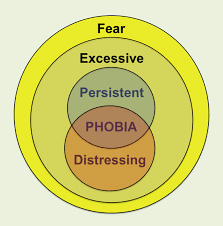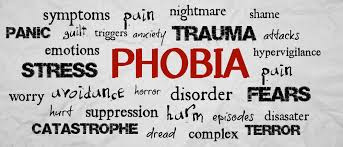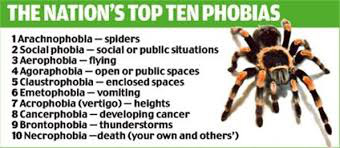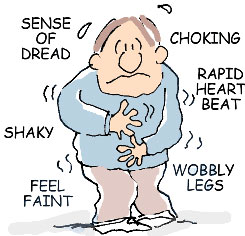Hypnosis Hypnotherapy Whitby Scarborough Filey Bridlington Pickering Malton Market Weighton Driffield York Guisborough Redcar Saltburn Middlesbrough Thirsk North Yorkshire UK

Treatments
Becoming free of Fears & Phobias
 Do you suffer from a fear or phobia which has a negative impact on your life?
Do you suffer from a fear or phobia which has a negative impact on your life?
Are there any fears that stop you from progressing socially or at work?
Have any fears or phobias been with you since childhood?
A phobia is regarded as an irrational and persistent fear of what a person subconsciously consider to be an unacceptable object, risk, situation or event.
Of course, fear is a natural and much needed emotion to protect us from danger. But phobias, and other fears, can take many forms which go beyond this safeguard. They can undermine our self-confidence, health and well-being.
Typically, phobias are effectively an expression of an emotionally upsetting event. However, they are an over-reaction to a perceived threat. Often a fear or phobia has been established during the early and most impressionable period of one's life, usually under 15 years of age.
Often too the emotional experience is hidden from full consciousness, having become 'programmed' into the automatic (subconscious) part of the mind. As such it becomes instinctive, not requiring any conscious thought to react.
Once the body has been programmed to react to an event, such as speaking in pubic, it will release adrenaline as a means of preparing for activity. Phobias are simple fears which the subconscious mind has recorded and saved to our long-term memory. We are programmed to respond and react in a split second without any conscious consideration of the level of danger. This is our survival mechanism at work, but one which is over-sensitive to the threat.
 Some phobias have multiple causes arising from emotional charged events, others are more specific down to a single event. All will have an initial sensitizing event which started the reactive process.
Some phobias have multiple causes arising from emotional charged events, others are more specific down to a single event. All will have an initial sensitizing event which started the reactive process.
Hypnotherapy can be very effective at resetting the subconscious mind's reaction to feel much less threatened, or indifferent, to previously phobic events. This hypnotic reprogramming can restore a more balanced response to a previously perceived threat to life. The new reaction will then be consciously, and not subconsciously, triggered so that non-threatening events are dismissed as such – not a danger to our health and well-being.
The relaxed state of hypnosis can often access the memory programming behind the instinctive response. Post-hypnotic suggestions can also retrain the mind to let go of the fear or phobia.
 Amazingly there are over 500 recorded phobias, ranging from fear of spiders to fear of open spaces.
Amazingly there are over 500 recorded phobias, ranging from fear of spiders to fear of open spaces.
Some are very specific, others are more general expressions of inner anxiety. They are part of the well-known 'flight or fight' response.
Just about any fear or phobia can be helped with hypnotherapy, including:
fear of flying (aerophobia), fear of being sick (emetophobia), fear of heights (acrophobia), fear of enclosed spaces (claustrophobia), fear of open spaces (agoraphobia), fear of crowds (enochlophobia), fear of dogs (cynophobia), fear of birds (ornithophobia), fear of fire (pyrophobia), fear of water (aquaphobia), fear of spiders (arachnophobia), to name just a few.
Treating Phobias with Hypnotherapy
Talking therapies, such as counselling, cognitive behavioural therapy and psychotherapy, are generally of limited value with phobias since they fail to address the underlying subconscious cause. Instead, hypnotherapy allows the subconscious mind to recover the point of input of the unwanted reaction. This will be what initially created the phobic response. And often it is not the causal event that it is consciously assumes to be, otherwise the phobia would be resolved at a conscious level. Within hypnotherapy, visualization, desensitization and anchoring techniques during hypnosis can also be used to further deprogramme the automatic phobic reaction. Phobias can therefore be removed as the subconscious mind is effectively reprogrammed
Panic attacks are periods of intense fear or apprehension that tends to be sudden in onset. They too are expressions of anxiety (like a volcano blowing it's top) and can be a frightening experience. Hyperventilation and some loss of control are typical symptoms.
Social Phobia or Anxiety
Social phobia can occur through setting unrealistically high personal standards, based on: 'I must not show any weakness or 'I am not good enough'. This is a preconceived belief that: 'I will feel stressed and tense in a social environment'. Such negative beliefs are held at a subconscious level and will automatically undermine social performance.
Often social anxiety is the fear of being humiliated through negative evaluation by others, particularly authority figures, such as a boss, teacher, senior colleagues, and the like. An underlying sense of inferiority may prevail too, which is harmful to the individual’s fragile ego.
So a self-fulfilling prophesy, based on previous experience, tends to happen. A belief that previously negative experiences will reoccur. This over-defensive response is seen to protect the sensitive ego. However, such negative self-beliefs can be commonly out-of-date, initially formed on a much earlier occasion in the person's life. But doubt from the earliest programming remain.
Hypnotherapy can do a great deal to build a new level of confidence, assertiveness and self-esteem.
In social phobia attention is internally focused. The person is over self-conscious of their words and deeds. The person is absorbed in concerns and worries, imaginary or otherwise. This adds fuel to inner fears. Self-consciousness often creates physical symptoms such as: muscular & mental tension, butterflies in the stomach, low or lack of eye contact, limited head movements, fidgeting & general inhibitions in thought, word and deed. The person might either not talk, or talk too much, depending on their personality. Hysterical people will talk too much; shy personalities will be reserved and socially withdrawn. Shyness often begins in childhood. It is also mainly due to conditioning (a learned response) which becomes consolidated and automatic in adulthood.
Anxiety can show itself physically, often as facial flushing (blushing), sweating and trembling.
According to research carried out in the United States, social anxiety disorder is the third most common debilitating condition after depression and alcoholism.
Social phobia, also known as social anxiety, is essentially an underlying fear. People who have social anxiety experience extreme and persistent anxiety associated with social or performance situations.
Put another way, social anxiety is the fear and anxiety of being judged and evaluated negatively by other people, leading to feelings of inadequacy, embarrassment, humiliation and depression. It can be a very debilitating and restrictive condition to live with and one with wide implications. Indeed, a source of unhappiness for many people. Groups of people can be a threat and the fear of being 'left out' is very real for the social phobic person.
If a person usually becomes anxious in social situations, but seems fine when they are alone, then 'social anxiety' may be their problem.
Of course, most people feel shy or nervous in new or uncertain situations. Public speaking or entering a room full of strangers for example, can cause anxiety to rise in many people. However this kind of common apprehension doesn't indicate a social phobia. It becomes a social phobia when it:
• Causes the person to avoid the feared situation
• Means the person endures the situation with intense distress
• Interferes significantly with work, education, family and social life
The most common situations that are feared by people who have social anxiety include the following:
• Speaking in public
• Eating and drinking in public
• Writing in front of others
• Meeting new people
• Being the centre of attention
• Meeting or talking to members of the opposite sex
• Being watched doing something
• Meeting or talking with people in positions of authority
• Being criticized
• Using the telephone
• Going around the room (table) in a circle and having to say something
What are the main symptoms of social anxiety?
When the person who has social anxiety is confronted by the feared situation, or even just thinks about the feared situation, extreme symptoms of anxiety result. The symptoms of social anxiety may include any or all of the following:
• High levels of anxiety when exposed to the fearful situation: palpitations, trembling, sweating, tense muscles, dry throat, blushing, dizziness, sinking feeling in the stomach
• An overwhelming fear of wanting to escape
• Feeling of self consciousness and inadequacy
• Avoidance of the feared situation, which can often lead to isolation from friends, family and society
• Reliance on drugs or alcohol to get the person through the feared situation
Social anxiety or phobia is one of the most common disorders, especially in relationships with the opposite sex. Hypnotherapy can be very successful at resolving these social issues.
Can I control the phobia myself?
Although not easy, the best way to live with a phobia is to ignore it. The more you think of your problem the more you will strengthen your ‘habit’.
Also, thinking about the possible cause of the phobia rarely works since this is engaging the conscious mind to resolve what is an unconscious problem.
Panic attacks
Panic attacks can often be closely associated with phobias. They are periods of intense fear or apprehension that tends to be sudden in onset. As an expression of anxiety (like a volcano blowing it's top) they can be a very frightening experience. Hyperventilation and some loss of control are typical symptoms, but these can also include:
• Palpitations, or accelerated heart rate
• Sweating
• Trembling or shaking
• Sensations of shortness of breath or smothering
• Feeling of choking
• Chest pain or discomfort
• Nausea or abdominal distress
• Feeling dizzy, unsteady, lightheaded, or faint
• Feelings of unreality or Depersonalization (being detached from oneself)
• Fear of losing control or even going insane
• Sense of impending death
• Numbness or tingling sensations
• Chills or hot flushes
The effect can be to literally destroy our self-confidence in social and business events alike.
Hypnotherapy can enhance your self-confidence and remove the restrictions causes by excessive fear.
If a person was involved in, or witnessed, a traumatic event it is normal to experience upsetting, distressing or even confusing thoughts and feelings. Traumas in childhood can go particularly deep.
Feelings of distress may not be felt immediately, rather the individual might be emotionally disbelieving or just feel numb inside. However after a 'gestation period', in which the mind absorbs and processes the event, the person could develop a strong emotional and physical reaction. They might get very easily upset, not be able to sleep, become over-anxious or get depressed.
Of course this is understandable, depending on the scale of the traumatic event. It could be the symptoms disappear quite quickly and there is a return to normality. Should they persist for longer than a month, or are considered extreme, the person could have Post-traumatic Stress Disorder or PTSD.
There are no time limits to the after effects of distress. Some people might not develop PTSD symptoms for many years after the trauma. Their early memory might be triggered by more recent stressful experiences such as several things going wrong at once: perhaps a bereavement, loss of a job, financial difficulties or divorce which create overload. The subconscious memory then precipitates a memory of the earlier traumatic emotions. In extreme form a mental breakdown could occur. We are all individuals with our feelings and reactions. We have differing abilities to mentally process our experiences. We've been conditioned and fine-tuned by events.
PTSD has more commonly been linked to military conflict and battle fatigue. In fact, any trauma of sufficient intensity can potentially create a lasting emotional effect in anyone. Traumas can include: rape, sexual abuse, sudden death of a loved one, road accidents, robbery, violence, severe neglect, domestic disputes or being held hostage.
Typical PTSD symptoms are:
• Constantly feeling on edge
• Being stressed easily
• Easily upset or angry
• Insomnia or disturbed sleep
• Irritability & aggressive
• Lack of concentration
• Being on edge or 'on guard'
• Nightmares & flashbacks
• Self-harming
• Low self-esteem
Other associated issues found with PTSD can include: severe anxiety, phobias, depression, dissociation and sometimes suicidal thoughts.
In hypnotherapy the fear and anxiety elements can be successfully addressed by various techniques, allowing the traumatic feelings to pass into obscurity.
Other conditions often encountered in hypnotherapy are hair pulling, skin scratching and skin picking. These too are expressions of anxiety and tension, often referred to as a displacement activities. These can be readily treatable.
 Learning to let go of Fears and Phobias...
Learning to let go of Fears and Phobias...


Across Scarborough Whitby Filey Hunmanby Seamer Bridlington Pickering Malton York Middlesborough Stockton Redcar Saltburn Guisborough Market Weighton Driffield Thirsk Kirkbymoorside Helmsley Kingston upon Hull Teesside East Yorkshire North Yorkshire and the North of England
Making an Appointment
We provide a Free and informal Initial Appointment (30 minutes) if requested to discuss your personal needs and establish if we can help. Please feel free to bring a friend along for company if you wish.
Please note:
If you telephone and we are with a client, you may be directed to leave a message. Please give your name and telephone number and a suitable time to call you back. Due to the confidential nature of our work, Alan personally takes all appointment bookings.
Hypnosis Whitby Hypnotist Filey Hypnotherapy Bridlington Hypnosis Pickering Hypnotist Malton Hypnotherapist Driffield Hypnosis North Yorkshire
Personal Development for Health & Success
Natural Relaxing Liberating
Scarborough Hypnotherapy –
the specialist in helping you
Become the Person You Want To Be.
Scarborough Hypnotherapy has no control of and accepts no responsiblity for the content and products of websites external to the Scarborough Hypnotherapy website.
© Copyright Alan Gray Scarborough Hypnotherapy Practice 2006-17. All rights reserved.